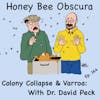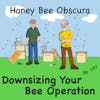Replacing The Queen (128)

Replacing a seemingly good queen can be a difficult decision to make. If her brood pattern is good, the colony temperment is nice, they've produced a good crop... and the only fault against her is that she is last year's queen... should you replace...
 Replacing a seemingly good queen can be a difficult decision to make. If her brood pattern is good, the colony temperment is nice, they've produced a good crop... and the only fault against her is that she is last year's queen... should you replace her with a queen raised this year?!
Replacing a seemingly good queen can be a difficult decision to make. If her brood pattern is good, the colony temperment is nice, they've produced a good crop... and the only fault against her is that she is last year's queen... should you replace her with a queen raised this year?!
There are many considerations to factor in. Your goals as a beekeeper, the time of year, is she with an established colony or perhaps from a swarm? It can be difficult to make that call to seek her out, pull her and crush her. Then... if you do replace her... do you buy a new queen or have the colony raise their own? How soon do you introduce a new queen? How do you know if the colony will accept her?!
On today's podcast, Jim invites Jeff Ott from Beekeeping Today Podcast, to talk about the Replacing the Queen.
__________________
Thanks to Betterbee for sponsoring today's episode. Betterbee’s mission is to support every beekeeper with excellent customer  service, continued education and quality equipment. From their colorful and informative catalog to their support of beekeeper educational activities, including this podcast series, Betterbee truly is Beekeepers Serving Beekeepers. See for yourself at www.betterbee.com
service, continued education and quality equipment. From their colorful and informative catalog to their support of beekeeper educational activities, including this podcast series, Betterbee truly is Beekeepers Serving Beekeepers. See for yourself at www.betterbee.com
______________________
Honey Bee Obscura is brought to you by Growing Planet Media, LLC, the home of Beekeeping Today Podcast.
Music: Heart & Soul by Gyom, All We Know by Midway Music, original guitar music by Jeffrey Ott
Copyright © 2023 by Growing Planet Media, LLC

Episode 128 – Replacing The Queen
[music]
Jim Tew: Hi listeners. I've been pondering how often the queen gets blamed for everything. It's just such a common recommendation. "Well, you need to replace the queen." They make it sound like that's just monkey see, monkey do. Sometimes it's challenging. I've asked a good friend of mine, Jeff, to sit in today and talk to us about what we would do if we had to replace the queen. Jeff?
Jeff Ott: Jim, thanks a lot for asking me along. I'm really happy to be here and really happy to talk about queens.
Jim: The thing is, Jeff, is that I don't want to be the old guy. I'm always the old guy. When Kim's here, he's always the old guy. Queens used to be cheap. They used to be available. Things have changed, and I don't know that beekeeping has changed quickly enough to keep up with new recommendations. Let's talk for a while if you don't mind, about when to replace a queen, why to replace a queen, and some of the things you can expect to go wrong or go right when you take this project on. Are you up for that?
Jeff: I'm up for it. Let's do it.
Jim: Hi, I'm Jim Tew.
Jeff: I'm Jeff Ott, from Beekeeping Today Podcast.
Jim: If you'll sit with us for a bit, we want to talk about this queen thing for a while.
Introduction: You are listening to Honey Bee Obscura, brought to you by Growing Planet Media, the folks behind Beekeeping Today Podcast. Each week on Honey Bee Obscura, hosts Kim Flottum and Jim Tew explore the complexities, the beauty, the fun, and the challenges of managing honey bees in today's world. Get ready for an engaging discussion to delight and inform all beekeepers. If you're a long-timer or just starting out, sit back and enjoy the next several minutes as Kim and Jim explore all things honeybees.
Jim: Jeff, I've already said in the introduction that it used to be straightforward. I cringe now as an old man, Jeff, when someone says, "Should I replace this queen?" because it sounds so simple. You get a new queen, you find the old queen, you kill her, you introduce a new queen and life goes on forever. No, not always, Jeff. One of the things that I began to wonder immediately upon being asked that question is to whom am I talking? Is this your first year of beekeeping? Is this your 15th year of beekeeping? Have you done this process one time? Have you done this process 15 times, 20 times? Because in a way - argue with me if you would - this is a surgical process that we're doing to this beehive. We're going in, we're convincing these bees that this parasite - as far as they're concerned - hat we're introducing is in fact a good parasite and they want to commit to her.
Jeff: You're talking about adding the new queen?
Jim: I'm talking about adding the new queen, the bees see that queen as an invader, as something foreign, as something to be rooted from the hive, to be removed from the hive. The first thing I want to know is, what are your abilities to do this? Because sometimes Jeff, I have learned that a particular beekeeper may be better off to keep a marginal queen and to try to make things better, and then by doing that, reintroduce or introduce completely different problems.
Jeff: Yes. The whole topic about queen replacement, and today especially it seems, is challenging because in the popular media and online, you see all sorts of talk about how bad the queens are today. They used to live five years. Now you can barely get nine months out of them. That does force the new beekeeper to consider, "Well, jeez, maybe I should be replacing my queen every spring. Am I supposed to replace it before the winter so they're strong in the spring?" It really creates a quandary for the new beekeeper and for the established beekeeper because as you stated, things are changing all the time.
Jim: Well, the first thing I want to tell anyone who's listening is that this is not an exact procedure, and this procedure is not guaranteed.
Jeff: It's another example of why they call it the art of beekeeping and not the science of beekeeping.
Jim: Yes. I don't call it art or science. That's all a total screw-up at times because you really took a marginal colony and successfully made it worse. Now, where I'm going with this, if you're a new beekeeper and you happen to be listening to this, you've got to learn sometime. Just because we're talking down on this whole process doesn't mean that you should hold back. It just means that your mentor may come in from a slightly different perspective. If you've never done this before, the first thing to decide is exactly how bad is that queen? Because you don't have any guarantee that the queen you put in there is going to be any better, except you will invest $30 or $35 or so for that new queen. It needs to really be a queen that needs to be replaced.
Jeff: That's $30 or $35 even more if you don't mail order it. If you add mail order and overnight shipping, because that's what they want to do in Queens, you're going to add another $60 to the price of that queen.
Jim: You're just really piling on here because I have to go get my queen, so I get in my truck and drive an hour and a half to my supplier and I get the queen and I talk make several conversations. Then back in the truck, back home, by then it's late afternoon. Do you keep her overnight? Do you put her in that afternoon? Questions, questions, questions. All of these things are the devil that's in the details on that easy comment, "You need to replace that queen." It's not always that easy.
Jeff: Why should a beekeeper consider replacing a queen?
Jim: Okay, let me just put some hard numbers on absolute chaos. Number one, I the beekeeper I'm responsible for this hive, and it's got a remarkably spotty pattern with a high drone population, and its early spring. It does not look good for that queen heading a colony that's going to be average, which is pretty much my goal, to have that colony average, so I'm going to replace that queen. Then you start that process of mail ordering, calling, getting recommendations from other beekeepers, in the vehicle to go pick this queen up so you have her expeditiously. I've decided to do that because this colony in the spring of the year is not going to make it.
Now, Jeff, if you ask me that question in the fall of the year, and queens are more difficult to get, the season's already changing and you think, this is late in the year to reintroduce this queen, have her do anything to get this colony ready to winter, I think I'd be better off to keep my below average queen till next spring and address this issue then because in the bright light of reality, if I make all this trip, all these drives, all this money spent, and she dies in the winter anyway, I didn't accomplish anything. The same colony, different seasons would result in many cases with me, a different decision.
Jeff: Is there another reason why one would replace the queen other than Spotty brood pattern?
Jim: I have replaced queens because they stung everybody at a two-mile radius. It took me the better part of two weeks to figure out what was going on back there. I had up close and personal conversations with my neighbor on his riding lawnmower about "Why these yellow jackets are so bad this year. I'm being stung all the time." I knew that it was not yellow jackets. I knew what was stinging him. They were my bees. After I figured out which one it was, I replaced the queen in a colony for no other reason than her offspring was incompatible with my human neighbors around me. Do you have other reasons? Poor brood pattern, not going to build up, not going to be a successful colony. Number two, too aggressive, too defensive, makes a scene in the neighborhood. She's got to go.
Jeff: What about a swarm and the queen that's in the swarm? She's typically the older queen. She may or may not survive the coming season. She may be replaced, she may be on her way out, but she's a queen that has created this colony that's healthy enough to swarm. Should a swarm queen be taken out or kept around?
Jim: The answer to that is, yes, she should be taken out, but the details that surround that simple answer are always what causes confusion. That queen did lead a colony that was able to build up, resist Varroa, produce worker progeny that went out and found all these resources, really did a nice job in its ecosystem. Now you own that queen but she has really had a lot of demands placed on her to successfully get to that point. One of the questions I would think, Jeff, is that you have to decide what your beekeeping philosophy is. Do you want this to be a natural thing where the bees run their own life or do you want to be right in the thick of their life with the color of queen that you want, the demeanor of queen that you want and all the genetic aspects that breeders are capable of adding now?
Let's assume that you're one of those beekeepers who wants to put in a good queen and you want to control the genetics of your colony. Yes, replace that queen. The thing that happens with me immediately is how difficult it is for me to take out a queen that's done a good job for no other reason that statistically she's probably not going to complete this season, sacrifice her and put a new queen in. I always think, just like saving old spark plugs, that somehow that queen will get better.
That spark plug was running a little bit. If you put it on the plate up there in the barn by the tractor, somehow it will get well and turn back into a good spark plug. The brutal reality is that old queen is not going to have a successful long retirement life, relaxed and watching late-night television.
That queen's going to die a lingering death. She's going to be killed by the bees in the colony. She's going to be tossed out front and the ants are going to eat her or you can just crush her. It's over quickly and it's done and your swarm colony is better off for going through the process. Shoot a hole in any of that, Jeff.
Jeff: I don't know if I can, but this is definitely a first of hearing a queen compared to a spark plug. I agree. I cannot disagree with you. That's perplexing and I know the beekeepers who make their living and put food on their dinner table from their bees, whether through pollination or honey or all the above, they see it as a business investment or a way of ensuring their ongoing revenue income. Replacement of the queen is a financial decision and boom, it's done. It's nothing personal, it's just business.
Jim: It's nothing personal, it's just business.
Jeff: For so many of us beekeepers, it becomes a personal thing. As you stated so well, it's very challenging to sit there and take a queen and say, "You've done well, but see you," and send her off to the great hive in the sky.
Jim: Gloomy subject. Can you give me just a minute to take a break and get over this? We'll hear from our sponsor and I'll be all invigorated when we return.
Betterbee: We know you have options when it comes to shopping for beekeeping supplies. What we believe sets Better Bee apart are three things. First, our commitment to innovating, trying out new products in our own apiaries, and then sharing them with you. Second, our focus on education and helpful customer service. Third, but not last, our fundamental company goal to help you be a successful beekeeper. Give us a call to learn more about any of our products or to ask a beekeeping question. We've got you covered. Visit betterbee.com to shop online today.
Jim: Jeff, you bring up interesting points there and I know it's human characteristics. I'm a retired man, I still want to be productive. I still want to be useful. When I take this queen out and say, "Well, it's time for you to be retired, but what a different retirement life you're going to have than the one that I want." I struggle with those emotions, but, yes, you really touched a good point. If you're a commercial beekeeper, this has to be done. It's got to be done now. You got to control the colony. You want those colonies to have maximal output and you can't go along and look at 300, 500, 2000 colonies and say, "This is a good queen. I think I'll keep her another season and this one next to it is bad." No. In those yards, they all get the same treatment. It's just financially efficient to do it that way. You just do it.
That whole thing, I didn't mean to struggle with it this much, but the challenge is for us as hobby beekeepers, we don't live in that commercial world. We do anguish over whether or not. The reality of it is if I get a swarm and that swarm builds up nicely and it looks really good, try as I might, most of the time I just let her go and I know that she's not going to go probably the rest of that season, much less the next season. Jeff, they used to live longer, but they just don't now. You said that early on that people complain about the queens not living as long. I sometimes wonder if it's because we've got these queens so pumped up now, they're so productive, they can just produce mammoth colonies. I don't always remember my old queens from 25, 30, 40 years ago being that productive. Are these new turbocharged queens burning themselves out faster because they're producing so much more? I don't know.
Jeff: You listen to folks and I take the easy way out and I say it's all the above. It's the pesticides in the environment. It's contaminants and pesticides and whatever else that's been absorbed by the wax that they're around all day long. It's the temperature of the queen during shipment as they come to your house, whether they come in the truck or they come in the overnight mail. It's all of the above that ultimately affects the livelihood of the queen and not to mention, once we get start talking about genetics and overbreeding and under breeding and good drone congregation areas and bad drone congregation areas, I think it all factors in one way or the other.
Jim: I like that. I think it all factors in. It's not simple, is it?
Jeff: No.
Jim: The “why” I started all of this was that when you stand there and look at the colony and you can see that compared to the colony on either side, this middle colony just is not up to par, it doesn't honestly matter exactly what happened. It only matters what the end results are, and if that colony can't deal with varroa and my treatment of varroa and if it can't survive the winner, then I'm not being a good bee manager here and I need to make some tough decisions right now while I have the season to do it. More often than not, that is to replace the queen.
Jeff: Good segue. How do you replace the queen Jim?
Jim: When I am struggling to do that, if the queen's gone or if I know that she's gone, I've got queen cells and I've got all the indications, the bees are moaning. The old book said the bees moan when the queen's not there, they do fan more. Either she's gone naturally or she's there and I see her happily being the queen. You just send her to heaven. You just pick her up and you crush her thorax and she's just done. It's quick and it's easy and she's done. Nothing's gained by putting her in a cage and saying, "I'll feed her." No, you won't. She's going to starve to death in that cage.
Jeff: Can I share just the first time I tried to kill a queen; I couldn't do it. I tried to squish her in my fingers and I couldn't do it. I put her on the ground and I started stamping on her trying to find her. I put her down on the grass and then she crawled away and I couldn't find her. It was like, "Oh my goodness." I created more of a havoc situation than-- It was so funny.
Jim: Way to go. Nice job, Billy Joe Beekeeper.
Jeff: I'm thankful there were no video cameras and people had cell phones like they do today because they would see me like I was trying to stamp out a fire.
Jim: How many great pictures have never occurred because there wasn't a camera close by when a beekeeper was doing something that they really didn't want the rest of the world to know about? She's gone. That queen's gone.
You said how to replace her, you've got to give them a day or two to accept the fact, for her pheromone to dissipate from the colony for them to be aware that "We are in serious trouble here," and there's a narrow window that you want to be there with that new queen confined in a cage because you let them go too long. Then they get their mind made up that they've got a queen that they're going to raise on their own and they really don't want this new queen that I'm trying to introduce. Take the old queen out, sacrifice her quickly, cleanly, get it over with, put the new queen in the cage, in the hive near the brood nest area where the younger bees are.
Then this is where Kim and I just go fist to cuffs over and over again. I can't tell you Jeff or anyone listening exactly how long to leave her. Watch the activity of the bees on the cage. If they're still just clinging to that cage and acting like they're sole reason in life is to get to that queen so they can murder her, then do not consider releasing that queen anytime soon. If the bees are lackadaisical on the cage and they're kind of agreeable and they move away when you brush them off, things are looking better. Probably around five to six days, you should be seeing that behavior. If you're still not seeing that behavior, be absolutely certain you got the original queen out of the colony. Just be crystal clear. If you're a brand-new beekeeper and you thought she wasn't there, you need to look again and be sure that she's not there.
Finally, when they do begin to act more agreeable to the cage, then at that point, I'll expose the candy plug if I'm using that kind of cage and I'll leave it there for a couple of more days, and then you keep looking and then at some point, Jeff, it's just my mental attitude, I've just had it. I’m done. This queen has been in this cage now for six, seven days, I've opened this colony three times, I've killed a queen, I'm just going to release her. At some point you just do it. If they don't release her naturally, then peel the wire back, release her, she's going to run out on the cage. There's a whole segment, Jeff, on what to do if she comes out and flies away. That's a totally different discussion. Let's assume for right now that she runs down amongst the bees, then I'll watch her for a while.
More often than not, right away, she's going to look for something to eat or she's going to beg for food from any surrounding worker and if those workers seem okay, then quietly close them up and leave them alone for three to five days. Let her settle down. The devil again is in the details because you're really going to want to open that colony up and check her but you really shouldn't, don't disturb them any more than possible while they greet and meet this new queen. It's not an exact process. I’ve got to tell you, sometimes you lose. Sometimes the best beekeeper out there would lose during this process. It's just how it is. If you don't do it, you're going to lose for sure.
[music]
Jeff: It's part of the joys of beekeeping.
Jim: It is. It's part of the art. You said [laughs] of beekeeping.
Jeff: Oh sure. Use my words against me, Jim.
Jim: Yes.
Jeff: [laughs]
Jeff: We've gone on and on here too long. Replacing queens has to be done. Replacing queens is never exactly easy to do, but that doesn't mean you don't try.
Jeff: Thank you, Jim. I appreciate you sharing your experience and your insights with me.
Jim: Thanks for talking with me. I had a nice time.
[00:22:59] [END OF AUDIO]
New to Honey Bee Obscura Podcast?
Here are some great episodes to start with. Or, check out episodes by topic.













